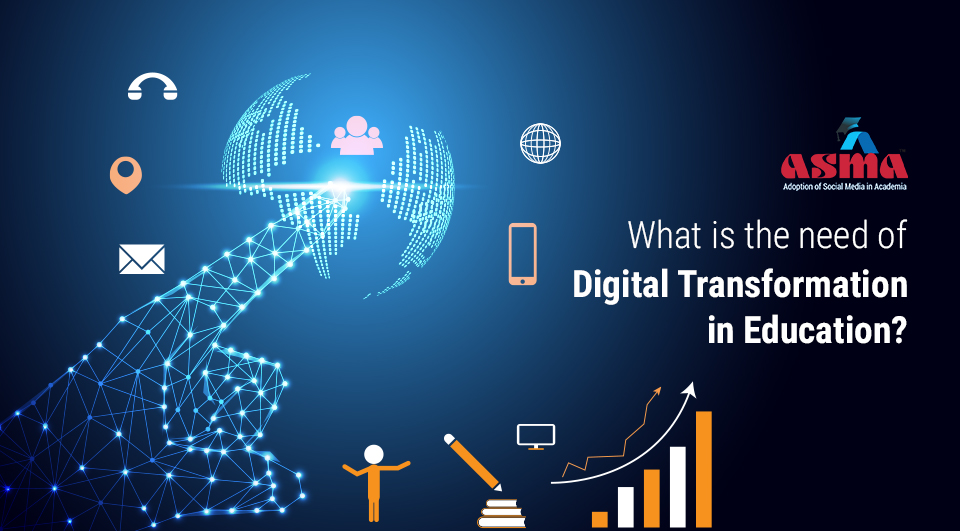What Is The Need of Digital Transformation in Education?
Extensive use of digital assets is changing the needs of modern learners. They are constantly looking for learning opportunities beyond the traditional classroom-based approach. To counter the situation schools and colleges need to develop alternative models of teaching for imparting education.
With the growing penetration of technology in our lives, there is a rising need for adapting digital technologies in the education ecosystem. Digital transformation in education can enhance the traditional face-to-face learning environment. It can enable teachers to innovate pedagogical models for creating better connect with students.
Today, most of the students are hooked on to a virtual world through the internet and smartphones absorbing a lot of content online. Schools and colleges are left with no choice but to adapt to it. Gone are the days when education was the prerogative of a chosen few. Technology has provided a level playing field for students from all sections of society. Constant technological progress with the growing popularity of social media and the Internet of Things (IoT) is driving the educational ecosystem.
As an imperative of social inclusion, there is a growing need in schools and higher education institutions to provide affordable and accessible models of education transformation to a wider variety of students. Some universities and EduTech companies have already started innovative virtual learning models by offering free online courses and certification programs.
While the course curriculum is an ever-evolving area based on current and future trends, teaching-learning methodologies is a specialized domain where experiments and innovations are particularly needed. At this juncture, technological interventions can add a lot of value to current pedagogical practices.
Digital transformation in education can enhance instructional learning, especially in higher education by creating a blended learning experience that combines both traditional classroom-based methods and modern technology.
Another important advantage of the digital transformation in education is in the management of education itself. Digitalization can help in automation of academic administration and other back-office operations in admissions, placement, alumni relations, student support services etc.
Every year, academic institutions face a tough task of submitting institutional data to several ranking and accreditation agencies. They have to depend upon a lot of manual work for compiling information from concerned departments. This can be overcome by implementing a robust management information system. Adoption of ERP system (Enterprise Resource Planning) can optimize academic productivity.
Digital interventions can help schools and higher education institutions to manage relationships with students, parents, alumni, teachers and other interest groups more efficiently. Digitalization of academic support services can further help to manage and monitor systems and processes more effectively. This will result in streamlining of administrative activities in schools and colleges.
Digital Future of Education: Road Ahead
Now when the need of digital technology in education is established, institutional leadership must ask the following questions before moving forward.
1: What is the current status of digital intervention in my institute?
2: What are the opportunities for adopting digital technologies in my institute?
3: What do we need to change?
4: What is the roadmap for change?
5: Who all will be the drivers for implementing change mechanism?
In the process of implementing digital technologies in your institute, make sure that your institutional ecosystem and its constituents/stakeholders understand the need to accelerate usage of technology in teaching and learning.
Evolve your institution’s digital strategy by understanding which direction your technology investments should take based on current and future trends. Invest initially in creating value for students by integrating technology with teaching and learning methods.
Digital transformation in education is a 21st-century necessity. Right from schooling to higher education, every level of our learning system is affected by technology. Rapidly evolving technology is transforming the way knowledge is imparted and absorbed today. Increasing digitalization is making way for new communication instruments enabling faster knowledge sharing in schools and colleges. It is redefining learning models in education and skill development.
Immediate action is thus imperative by all stakeholders including academic leaders and policymakers to enable more efficient and responsive integration of technology in academia. The need is to identify meaningful and relevant use of digital technologies to improve students’ overall learning management system.
Digital transformation of our education system will require commitment from all stakeholders. There is a growing need to integrate the smart use of digital technologies to enhance the teaching-learning experience. New technologies in education such as cloud computing, MOOCs, smart boards etc. are already impacting the teaching-learning process in a big way.
Leadership support will play a crucial role to make digital transformation in education is effective in schools and colleges. Academic leaders need to adopt new working ways and approaches that involve the use of innovative technology.
Adoption of new educational technologies will enable teachers to make drastic improvements in academic delivery and students’ assessment process. It can enable a better learning experience for students and improve job prospects.
One of the major reasons for the inclusion of digital technologies in education transformation is the development of more personalised content with greater access to courses for skill development.
However, digitalization will only be effective if the technology is used as a tool to drive systemic and institutional changes to impart knowledge and develop job skills and not merely to automate and fast track the process of learning.
For further readings:-
Educators Need To Be Aware Of The Pace Of Digital Transformation – Dr Thomas John
The Right Culture In Academia Is The Key To Its Digital Transformation – Dr Rajesh Panda




